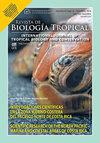将SES框架应用于哥斯达黎加太平洋沿岸的珊瑚礁恢复项目
IF 0.6
4区 生物学
Q4 BIOLOGY
引用次数: 0
摘要
引言:全球和当地的压力导致珊瑚礁健康状况迅速下降。珊瑚的高退化率推动了世界各地的恢复倡议。对这些举措的评估提供了关于珊瑚恢复技术和项目面临的限制的宝贵信息。然而,大多数文献都集中在评估与片段存活率和生长相关的指标上,在理解治理结构等社会方面如何影响项目成果方面存在差距目标:本研究应用社会生态系统框架来确定有助于哥斯达黎加三个珊瑚礁修复项目成功的社会和生态因素。方法:从50个半结构化访谈中收集数据,访谈对象包括项目成员、志愿者、旅游经营者、渔民以及相关社区和政府组织,并使用社会生态系统框架确定的类别进行分析。结果:尽管每个案例都有特定的生态和治理特征,但研究结果表明,三个主要步骤有助于项目的成功。首先,当地人对珊瑚礁和项目效益有积极认识的重要性;第二,利用网络结构获得足够的财政和人力资源,第三,遵守监管框架的重要性,为珊瑚礁恢复创造有利的环境。结论:研究结果表明,珊瑚礁修复项目没有通用的解决方案。项目经理必须了解修复地点的生态和社会背景,以提高珊瑚礁修复项目所能提供的好处,例如增加当地管理、创收和创建更具韧性的社区。本文章由计算机程序翻译,如有差异,请以英文原文为准。
Applying the SES Framework to coral reef restoration projects on the Pacific coast of Costa Rica
Introduction: Global and local stressors have led to rapid declines in coral reef health. The high rates of coral degradation have motivated restoration initiatives worldwide. Evaluation of these initiatives has provided valuable information regarding coral restoration techniques and limitations faced by projects. However, most of the literature is focused on evaluating metrics related to fragment survival rate and growth, leaving a gap in understanding how social aspects such as governance structure affect project outcomes
Objective: The present research applies the Social-Ecological Systems Framework to identify social and ecological factors contributing to the success of three coral reef restoration projects in Costa Rica.
Methods: Data was gathered from 50 semi-structured interviews with project members, volunteers, tour operators, fishers, and related community and government organizations that were analyzed using the categories determined by the Social-Ecological Systems Framework.
Results: Despite each case’s specific ecological and governance characteristics, research results show that three main steps have contributed to project success. First, the importance of locals having a positive perception of coral reef and project benefits; second, the use of network structure to obtain adequate financial and human resources and third, the importance of compliance with a regulatory framework to create enabling environments for reef restoration.
Conclusions: Results show no universal solutions for coral reef restoration projects. Project managers must understand the ecological and social context of the restoration site to boost the benefits that reef restoration projects can provide, such as an increase in local stewardship, income generation, and the creation of more resilient communities.
求助全文
通过发布文献求助,成功后即可免费获取论文全文。
去求助
来源期刊

Revista De Biologia Tropical
生物-生物学
CiteScore
1.80
自引率
0.00%
发文量
23
审稿时长
4-8 weeks
期刊介绍:
The Revista de Biología Tropical / International Journal of Tropical Biology and Conservation is a mainstream scientific journal published since 1953 and covered by Web of Science; Science Citation Index; Current Contents; Google Scholar; Scopus, SciELO and nearly 50 additional indices.
A double blind system guarantees you a fair evaluation, and our world class editorial and scientific boards provides a first decision in three working days. The journal is Full Open Access and is widely read where your article can have the highest real impact.
Since its beginning in 1953, the Revista follows these principles: objective and independent evaluation of all manuscripts; transparency in all processes; ethical use of procedures, data, specimens and subjects; fair treatment of all parties; and absolute predominance of scientific rigor over any other aspect.
 求助内容:
求助内容: 应助结果提醒方式:
应助结果提醒方式:


